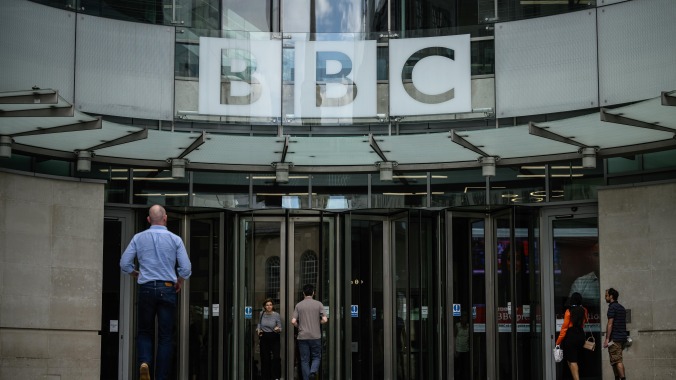BBC headquarters Photo: Leon Neal
For nearly a week, England’s most prestigious—or at least most omnipresent—news organization, the BBC, has been embroiled in a prolonged scandal, and one that has felt at least a little more prolonged because of how gradually any information about it has been released. It began last week, when British tabloid The Sun published a story claiming that an unnamed “presenter” for the BBC (a term that would cover any kind of host for various kinds of shows) had been accused of paying thousands of dollars over the course of multiple years to a teenager in exchange for elicit photos (with the alleged victim, who was 17 at the time, supposedly using the money to buy crack cocaine).
The BBC, to its credit, began openly reporting on the allegations against one of its own presenters, later confirming that it had been aware of the allegations for months, that it had already begun investigating them, and that an unnamed member of the staff had been suspended. But with so few actual details released or confirmed, multiple BBC employees had to make public statements denying that the allegations were about them, with some even contacting the authorities after they were falsely accused on social media. Most seemed to take it in stride, but BBC correspondent Lucy Manning insisted that the organization would have to share more information out of fairness to its other employees.
On Wednesday of this week, though, the wife of news anchor Huw Edwards confirmed (via CNN) that he was the subject of the accusation and that he was currently being treated at a hospital for “serious mental health issues.” She said that she put out a statement on his behalf “out of concern for his mental well-being” and to protect their children.
Just before that, a lawyer for the alleged victim—generally referred to only as a “young person”—put out a statement saying that the young person had denied that anything had happened and that they had also contacted The Sun to deny its claims after the original story was published. The lawyer also noted that nobody from The Sun had contacted their client and that the young person and their mother, who had spoken with The Sun, were “estranged.” The paper, however, claimed that it has seen evidence to support the claims made by the young person’s mother.
Meanwhile, the explanation for why Edwards wasn’t named by any of the press involved falls on the U.K.’s defamation and privacy laws, which are comparatively complicated versus what the U.S. has. Edwards was never under investigation by the police (and won’t be, according to the police), but even if he had been, any organization naming him as the accused would’ve had to face particularly close legal scrutiny to justify it, especially once the alleged victim denied that anything had happened.
So, what we know at this point is that The Sun published accusations that a BBC presenter had paid a then-teenager for sexually explicit photos. The young person denied the accusations, but the BBC launched an investigation and suspended the presenter in question, who was later publicly identified as Huw Edwards—a 20-year veteran of the BBC’s popular News At Ten—though Edwards has not publicly addressed the allegations himself as he’s currently in the hospital. The BBC has said that it will continue investigating, and Edwards’ wife has said that he will address the allegations when he is able to.









































